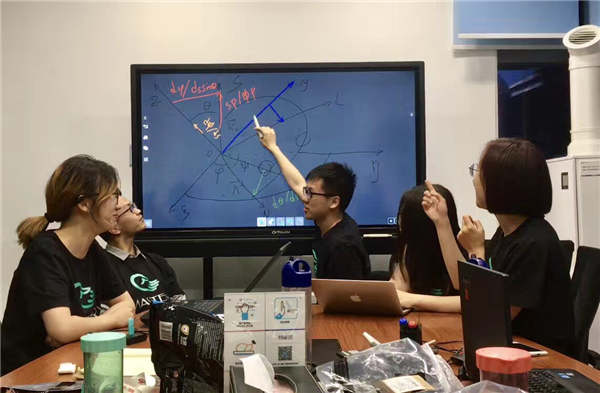Learning about innovation and entrepreneurship
 |
|
Li Qiucheng (center) from Tsinghua University speaks with classmates in an innovation course. Provided To China Daily |
As his classmates are busy dating or staying up for final exams, Li Qiucheng, who is doing an elective course, is developing a virtual reality device with partners from different majors with the help of top industry experts.
The 24-year-old industrial engineering graduate student from Tsinghua University is working on a VR glove called Mastery to improve the current VR experience.
"This course is only two credits, accounting for only one-12th of the total credits. But it is one of the most impressive courses I have done in my 18 years of study," says Li.
The elective course Li is taking - Innovation and Entrepreneurship: Silicon Valley Insights - was launched in 2013 by Tsinghua University's x-lab, a university-based platform designed to foster student innovation and entrepreneurship.
Nearly 200 students from 21 countries in 50 teams are involved in startup projects that include a VR device and health-monitoring equipment, according to x-lab.
"I hope this course acts as a spark to ignite students' interest in innovation and entrepreneurship," says Li Jizhen, an associate professor from the School of Economics and Management at Tsinghua University.
With China's economy growing, universities are trying to provide better facilities for students.
Chen Jining, the former president of Tsinghua University, says that "without innovation, there can be no transformation".
Students should start from China but also look to the world to address bigger challenges.
The university platform has so far provided training to more than 30,000 students and helped set up over 1,000 enterprises, besides helping to raise nearly 300 million yuan ($43.75 million).
Meanwhile, in order to help Li and his classmates, x-lab has invited industry experts and fund managers to give lectures and share their experience in innovation and entrepreneurship.
Then, with a project-based learning approach, students from different majors form teams and start their own projects.
Then, the teams are assigned mentors.
Michael Antonov, co-founder and chief software architect of Oculus VR, a leading company in the industry, was invited to give lectures about social VR and shared his startup experience with the students, including Li Qiucheng.
"We had ideas before we took the course," says Li Qiucheng.
"But now we have set up the business model and found like-minded friends, and are focused on our vision.
"This course helps us take the first and most important step (toward innovation and entrepreneurship)."
















